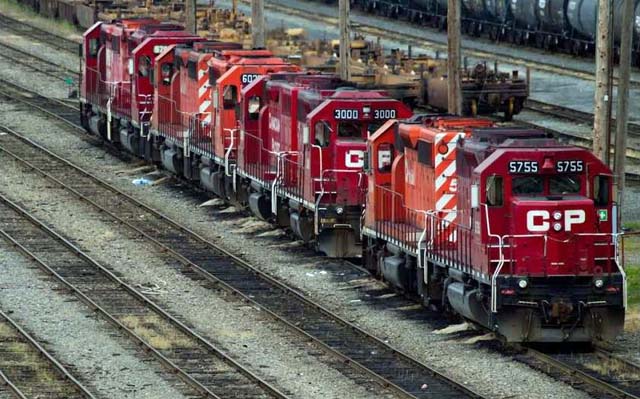
Number of Hours Crews Spend
at Locomotive Controls
Calgary Alberta - Canadian Pacific Railway (CP) said Thursday it will be asking Transport Canada (TC) to reduce the number of hours railway
employees can spend at the controls of a train under Canadian law.
The Calgary-based railway, which is currently butting heads with the Teamsters Canada Rail Conference (TCRC), which represents approximately 3,000 of its
engineers and conductors, over its workplace fatigue management practices said it has provided notice to the union of its intent to pursue the
change.
The current federal rule allows locomotive engineers and conductors to operate a train for up to 18 hours at their discretion.
CP said it is asking for a new rule that would allow train and engine employees to operate for a maximum of 12 hours before getting rest.
"We are committed to the health of our employees and our operations," said CP President and Chief Operating Officer Keith Creel in a
statement.
"We are requesting a one-third reduction in the maximum operating time of unassigned train and engine employees. As we are unable to get the TCRC
leadership to the table to have meaningful discussions on this topic, we must find alternate ways to improve the work/life balance of our employees while
enhancing safety across our network."
CP and the Teamsters have been at odds over how to improve scheduling and minimize workplace fatigue at the railroad, where conductors and engineers currently
work on an on-call basis without set shift schedules or lengths.
While mandatory rest periods aren't part of the system, employees have the ability to voluntarily take advantage of numerous opportunities for time off and
rest when they want it.
Two years ago the company tried to institute mandatory rest provisions, but the move prompted the filing of a grievance by the union, which said forcing
employees to rest when they aren't tired wasn't helpful and could even prevent train crews from getting home to their families in a timely manner.
In August, an arbitrator ruled in the union's favour, saying CP had provided "absolutely no evidence" to demonstrate that mandatory rest after every
run would reduce fatigue or make the workplace safer.
However, the arbitrator went on to say railway workplace fatigue is an important issue, and the two sides should address it in collective
bargaining.
The union will now have until 7 Jan 2017 to respond to CP's requested rule change, after which time the railway will file its proposal with TC.
The agency will then have another 60 days to decide whether to approve the new rule, meaning a decision should be expected by the spring of 2017.
Amanda Stephenson.



